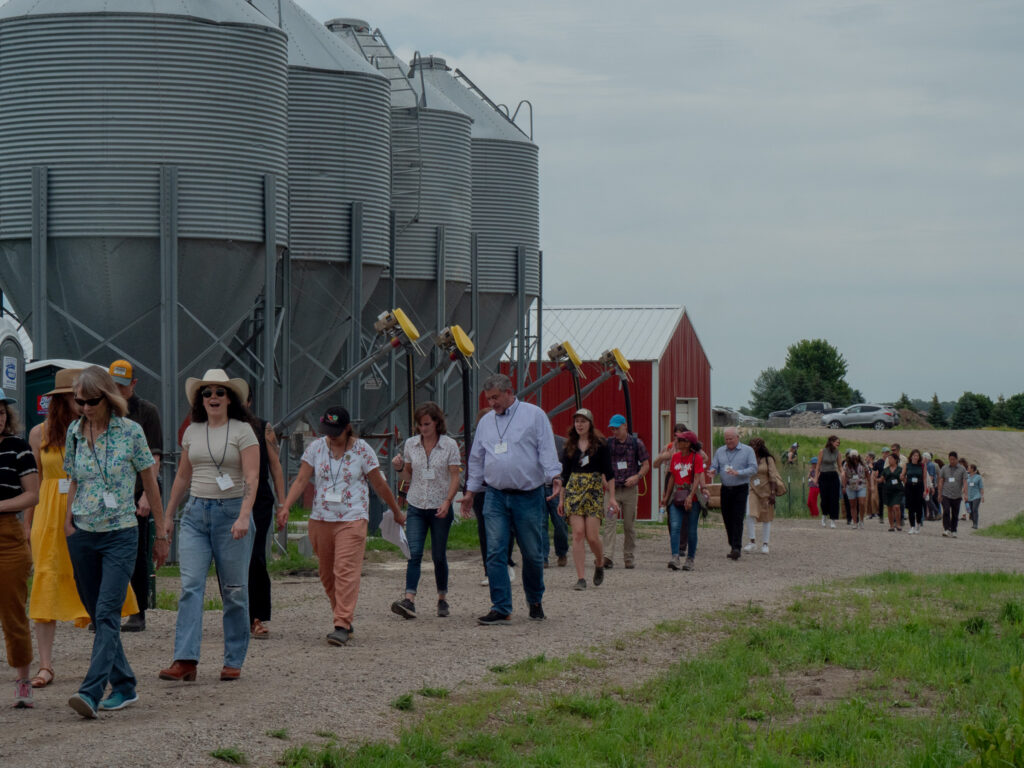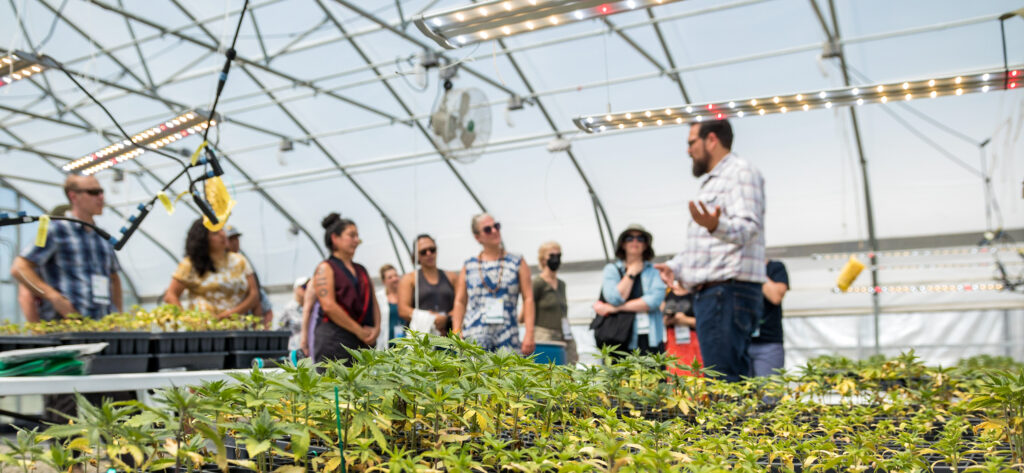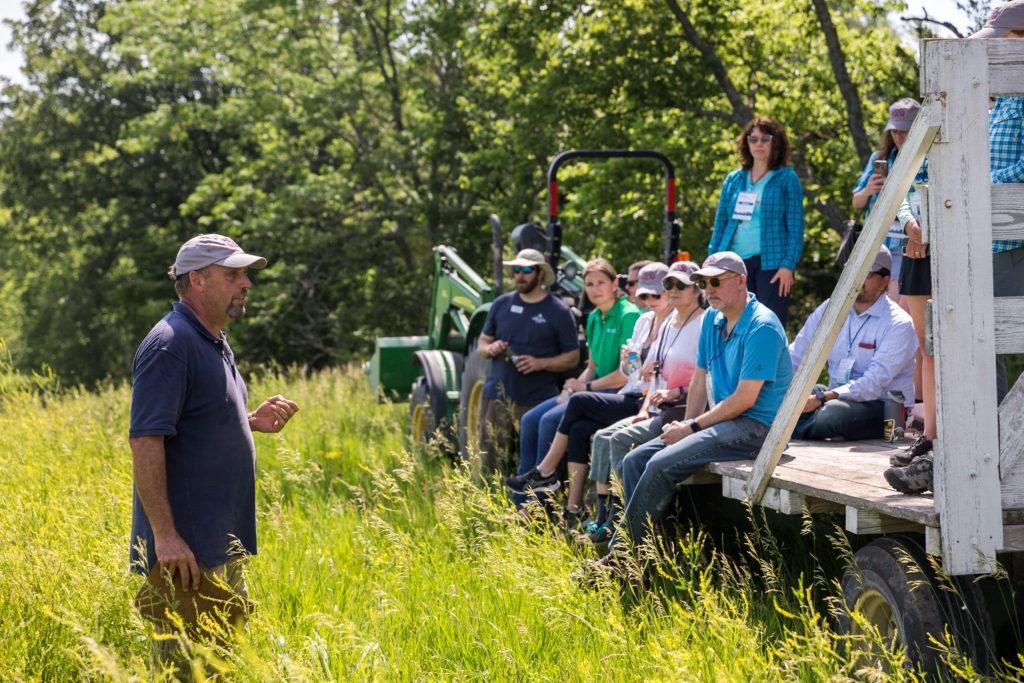
- This event has passed.
Rising Heat, Rising Risks: Protecting Farmworkers in a Changing Climate
August 6, 2025 @ 12:00 pm – 1:30 pm PDT
Heat stress for outdoor workers lies at the intersection of climate change, labor rights, agriculture, and public health. Heat is the leading weather-related cause of death in the U.S., and farmworkers are especially vulnerable, being 35 times more likely to die from heat-related exposure than other workers. As temperatures globally rise, the number of unsafe working days for farmworkers due to heat is projected to double by the middle of the century. Without autonomy over their schedules or a federal OSHA standard regulating heat stress hazards in the workplace, farmworkers are often forced to labor through extreme temperatures or smoke from wildfires.
In this webinar, a panel of farmworker organizers, health experts, and policy advocates, will discuss the impacts of extreme heat on farmworkers and how we can advocate for a more just food system.
By the end of this webinar, attendees will:
- Understand how the climate crisis threatens farmworkers’ health and safety
- Gain insight into the exploitative environments faced by farmworkers
- Learn about the farmworker-led movements for improved protections and working conditions
- Understand the federal and state policy landscape, including constraints and opportunities
- Recognize opportunities for action and advocacy
This webinar is open to all. We especially encourage you to attend if you are:
- A climate funder interested in the intersections between the climate crisis and agriculture
- A policymaker focused on climate, public health, labor or food systems
- A member of the public wondering how you can support farmworkers facing exploitative work environments
This webinar will be held in English and Spanish with interpretation for those who need it.
Speakers
Davin Cardenas, Organizing Director, North Bay Jobs with Justice

At North Bay Jobs with Justice, Davin Cardenas is organizing farm workers in Sonoma County towards a Just Transition, where workers challenge the most negative impacts within the wine industry, while training themselves in traditional ecological knowledge to protect the mother earth, and to have better jobs. Davin has lived in Sonoma County since 1999, graduating from Sonoma State University with a BA in Liberal Studies, and has been a community organizer for over 20 years, organizing immigrant and faith based communities for social, ecological, and economic justice. He has been trained in popular education, as well as Alinsky-ian organizing methodologies, and believes that solutions abound when we listen to the land, and listen to the workers. He also likes to run trails, read, and is a Golden State Warriors fan, naming his cat Curry, born the same year Steph Curry broke the NBA single season 3 point record for the first time (2013).
Anastasia Christman, Senior Policy Analyst, National Employment Law Project

Anastasia Christman joined National Employment Law Project (NELP) in June of 2011 as a policy analyst and has worked on issues of responsible outsourcing policies, green jobs, quality apprenticeship programs, and efforts to support workers in the financial services industry.
Before coming to NELP, she helped to organize several thousand security officers in a city-wide campaign in Seattle and supported organizing and bargaining for tens of thousands of unionized janitors throughout the Western United States. She was the elected Vice President of SEIU Local 6, in Seattle, representing building service workers. Between 2000 and 2002 she conducted industry research for AFTRA, especially focused on Spanish dubbing artists for daytime soap operas, and for the Writer’s Guild looking at animation practices for shows like Spongebob Squarepants.
Anastasia also spent several years investigating the private equity industry and leveraged buyouts and their effects on the front-line employees of purchased companies. The highlight of her pre-NELP career was wearing a wig and a purple spandex jumpsuit as part of an Abba-inspired band criticizing the political power of the private equity industry. Before that, she taught women’s history, the history of Los Angeles, and urban history at UCLA, Occidental College, and Pepperdine University.
Juanita Constible, Senior Advocate, Climate Adaptation, Natural Resources Defense Council

Juanita Constible is a senior advocate in NRDC’s Environmental Health program with more than 17 years of professional experience in communicating about the impacts of climate change. She works with partners across the United States to advance solutions to the health and safety threats of extreme heat, including workplace heat standards and forward-looking heat planning by federal and state agencies. Prior to joining NRDC, Juanita oversaw the science and solutions department at the Climate Reality Project, and later served as an adviser to the Climate Action Campaign. She holds bachelor’s and master’s degrees in biology from the University of Victoria in Canada.
Elizabeth Mizelle, Assistant Professor, Baccalaureate Education, College of Nursing, East Carolina University

Elizabeth (Liz) Mizelle, PhD, RN is a nurse educator and researcher who has led multiple community-based and field research projects focused on the health effects of climate change and occupational exposures in rural populations. Currently funded by the CDC/NIOSH, her research evaluates a workplace intervention aimed at preventing dehydration and heat-related illness among farmworkers in North Carolina. Dr. Mizelle brings fourteen years of nursing experience in both rural and tertiary care hospitals, along with a decade of service as nursing faculty. She is an AgriSafe Nurse Scholar, a graduate of Yale’s Climate Change and Health Certificate Program, and is currently completing the Total Worker Health® Certificate Program at UNC-Chapel Hill. She is an institute member of the North Carolina Agromedicine Institute and serves as co-chair of the Policy and Advocacy Workgroup for the Carolina Advocates for Climate, Health, and Equity.
Yesica Ramirez, General Coordinator, Farmworker Association of Florida

Yesica Ramirez Garcia, the General Coordinator of Farmworker Association of Florida (FWAF) and the first woman to hold this role in its 40+ year history, brings a unique combination of firsthand experience as a farmworker and 12 years of service as a local organizer to her position. Her journey from farmworker to leader is a testament to her resilience and dedication.
Born in Michoacan, Mexico, Yesica worked as a farmworker on land her family did not own before migrating to Apopka, Florida, where she worked in plant nurseries, exposed to harmful chemicals without proper protection. After developing health issues and a complicated pregnancy due to pesticide exposure, she left the nursery and discovered her passion for advocacy through participation in training and demonstrations at the Farmworker Association of Florida.
Yesica’s commitment to health and safety protections for farmworkers has driven her work, from volunteering to leading roles in the organization. As Apopka Area Organizer and now General Coordinator, Yesica has organized workers and challenged the inhumane laws that have passed through local, state, and federal governments, fighting for social justice and for immigrant and workers’ rights. She has done everything from large food distribution events and vaccination days during COVID, hurricane disaster relief and response work in Central Florida, organizing demonstrations against unjust evictions, participating in community-based participatory research projects, creating Facebook Live events to inform the community, organizing Know Your Rights community meetings, participating on the Board of Directors of the Florida Immigrant Coalition and the Food Chain Workers Alliance, supporting victims of domestic violence, and much, much more.
Leticia Zavala, Co-Coordinator, El Futuro Es Nuestro

Leticia Zavala was born in Zacapu, Michoacan in 1979. At the age of six, her family migrated to the United States and immediately started following the migrant stream from Florida to Ohio, Michigan and Pennsylvania. In her teenage years, she became a member of the Farm Labor Organizing Committee, FLOC, as her family was working on a union farm. With the support of a migrant education foundation, she obtained a scholarship that helped her pay her way to college, and she graduated with a bachelor’s degree with a major in Sociology from Florida Southern College. After college, she got a call to return to the fields as an organizer and she joined the ranks of the Farm Labor Organizing Committee (FLOC) once again. Since then, she has worked with immigrant communities in Mexico and North Carolina pushing to improve working and living conditions of agricultural workers. She is a member of Colectivo Binacional de Mujeres Migrantes, and part of the immigrant advisory council for the city of Zacapu, Michoacan. In 2017, Leticia was elected to serve on the executive board of the Farm Labor Organizing Committee, and she led FLOC’s organizing efforts in North Carolina for many years. In 2022, she joined an effort of FLOC members to take back the union for rank-and-file workers, and Leticia ran in the first contested election of the Farm labor Organizing Committee. Days after the election, Leticia was fired. Thirty farm workers joined together to found El Futuro es Nuestro / It’s Our Future, A farmworker led nonprofit that is leading the way to improve working and living conditions for farmworkers in North Carolina.
This webinar is hosted by Sustainable Agriculture and Food Systems Funders and sponsored by Center for Disaster Philanthropy, Funders for Regenerative Agriculture, Grantmakers Concerned with Immigrants and Refugees, Grantmakers In Health, Health and Environmental Funders Network, Integrated Rural Strategies Group, Neighborhood Funders Group, and Philanthropy CA.



